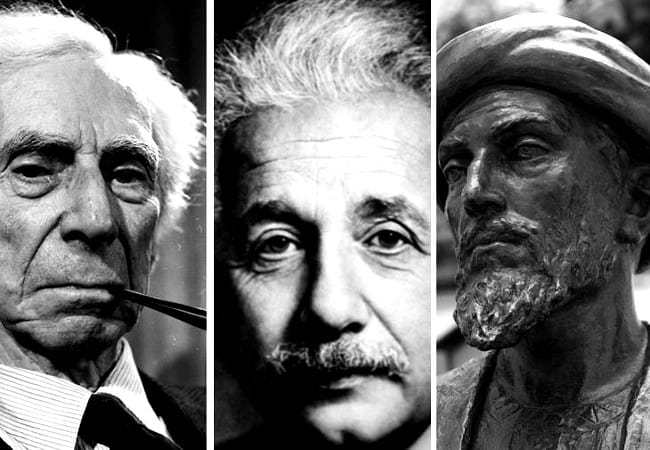Choosing ten of the greatest minds in history proved not to be quite so easy as this particular writer thought. Intelligence is measured by numerous different standards, ranging from simple IQ to great scientific or artistic achievement. Those achievements might be cumulative, in terms of a lifetime’s work, or a single, startling accomplishment that implants a person in the pantheon of human brilliance, never to rise – or shine – ever again.
Our good and loyal friend Merriam-Webster defines intelligence variously as: the ability to learn or understand; to deal with new or trying situations; to apply knowledge to manipulate one’s environment; to think abstractly as measured by objective criteria; to comprehend and to perform computer function.
What this definition implies, however, is simply the coordination of brain and body in the business of living, and survival. Such is the basic requirement of advanced life on earth. It does nothing to explain reason, philosophy, science and art, the three areas where mankind rises, and soars above the common run of earthly creatures. It is within the realm of reason that this higher element of intelligence, vaguely described as ‘genius’, is typically to be found. In this list we are not going to rely on simple IQ to make our selection, because raw intelligence is not always a factor of genius, but instead we will dig into some of the more celestial elements of human creation, and see what we come up with.

Jedediah Buxton, the first recognized autistic savant
We’ll kick off with a rather obscure name in the annals of genius. Jedediah Buxton was what is known today as an ‘autistic savant’, which differs from the original French definition of the word ‘savant’. In the original, the word ‘savant’ simply implies an expert in some field or another. Napoleon, for example, in his famous expedition to Egypt in 1798, was accompanied by a corps of ‘savants’ who provided the academic ballast for a venture that was to be part military, part cultural and part scientific. These were simply men of science and engineering, and although brilliant, they did not typically rise to that higher level that we are trying to identify here. Savant in the modern context, however, means something different, and something much more.
An autistic savant implies a brain damaged by a syndrome, and dysfunctional in the conventional sense of the word, but in the unconventional sense, gifted with a brilliance that is often difficult to quantify. Who was Jedediah Buxton? He is described by Wikipedia as ‘a mental calculator’, which, of course, recalls the ‘Rain Man’ phenomenon that is today something a benchmark of autistic savantism. There is a very thin line between genius and insanity, and prior to modern psychoanalysis, a great many autistic savants were classified as the latter. Buxton was fortunate that he appeared on the scene at a time when European intellectual society was emerging from the Dark Ages, and as enlightenment was replacing superstition and ignorance as the basic social standard.
He could neither read nor verbally communicate with any particular competence, and his general knowledge and literacy was quite limited. What caught the eye of the amateur sociologists who eventually took him in hand was his extraordinary grasp of numbers. He saw the world in numbers, instinctively understanding their relative proportions and their progressive denominations. The first recorded incident of this was his precise measurement of a tract of land of some one thousand acres, simply by waking over it. His first measurement was in acres, but then he narrowed it down to roods and perches, common measurements of the time, and then square inches, and finally hair’s breadths.
Bearing in mind that mathematics, although taught in rural schools, was understood on only a rudimentary level, and moreover, that Buxton had no real education at all, it is easy to see that such an odd preoccupation could be construed as madness. When he appeared in London in 1754, however, he became an object of fascination to contemporary scholars, and was granted a gratuity simply to be available for study, and to further develop his mathematical genius. A generation or two earlier he may well have been banished or burned at the stake, but thanks to enlightenment, he is now remembered as one of the greatest minds in history.

